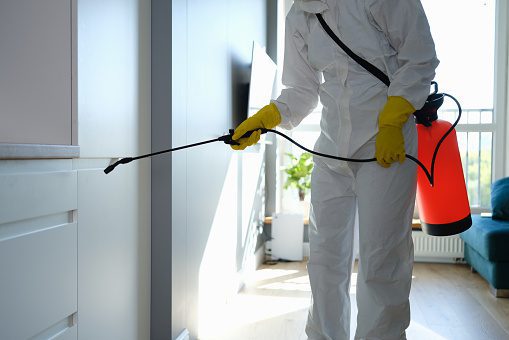
| Exterminator Key Stats | |
|---|---|
| Avg. Salary / year | $37,130 |
| Avg. Pay / hour | $17.85 |
| Education | 0-6 Months |
| Job Outlook | 7% |
Exterminators are pest control workers who are experienced in eliminating and controlling a variety of unwanted insects or creatures from a client’s property.
Pests can be removed from a variety of areas including businesses, or from inside or outside of a client’s home.
Individuals who want to become an Exterminator will have a knack for being able to work with rodents and insects that the majority of people would like to stay clear from.
In addition, Exterminators are well versed in a variety of insect or rodent killers that are safe for the environment who that are proven to work and eliminate pests on the first try.
Table of Contents
Education Requirements to Become an Exterminator
Individuals who want to become an Exterminator will need to have a high school diploma, seek a license, complete on the job training and have acceptable driving records in order to enter this profession.
A high school diploma may be substituted by passing a GED course and exam.
A clean driving record is required for positions that need to travel from one location to another.
Many Exterminators begin their careers in an entry level position such as a Technician where they gain on the job experience.
During this time, individuals will also receive technical training on equipment and pesticide use and its safety.
They may also learn specialties such as: fumigation, termite control or rodent control.
This specialized training can take up to three months to complete.
Individuals who want to become an Exterminator will also need to be licensed in order to work in this profession.
Requirements to become licensed differ by state, but as a whole, individuals must complete training and pass a licensure exam.
Some states have additional requirements such as completing an apprenticeship, having a highs school diploma or its equivalent or passing a background check.
For specific information on licensing requirements, contact your local state department.
Exterminator Job Description
Exterminators are experienced in working on a variety of properties including businesses and private homes to eradicate and eliminate a variety of pests from the premises.
Some common types of pests removed from homes or businesses include the following list:
- Termites
- Cockroaches
- Bedbugs
- Rats
- Ants
In addition to these common pests, Exterminators may also remove and eradicate a variety of other creatures that are specific to a certain region.
An Exterminator will begin their job by driving to a client’s building and provide an inspection to determine the damage and extent of infiltration.
Exterminators with clean driving records will be responsible for driving to and from business and client’s homes.
An inspection will help an Exterminator determine the extent of damage to both a building and the premises extending beyond.
After completing an inspection, Exterminators will determine the best treatment in order to eradicate pests.
In order to determine how much treatment is needed, Exterminators will need to determine the dimensions of the area needing treatment.
Using this information, they will provide an estimate of the cost to eliminate pests.
They will then use a variety of baits, traps, pest management plans or pesticides.
Exterminators will then set up pest preventers such as barriers to prevent any future infestations inside a home or business.
Exterminator Salary and Career Path
In 2012, the median wage for Pest Control Workers, which includes the Exterminator profession, was approximately $30,060 per year.
Exact wages will depend on level of experience with some Exterminators earning up to $47,770 per year.
The majority of Exterminators work full time with some hours covering evening and weekend hours to accommodate client schedules.
The job outlook for Pest Control Workers and Exterminators looks promising because it is expected to grow faster than average.
Job opportunities for these professions are expected to increase by 20 percent through the year 2022.
This increase reflects a demand from consumers to use professional pest control services reflecting their environmental and health concerns.
Individuals who are interested in a career as an Exterminator have plenty of reasons to enter this profession.
The biggest upside being the fact that this profession is expected to grow at a faster than average rate.
In addition, the education requirements are comparatively easy to complete making it a profession that one can enter in a short amount of time when compared to other professions.
![]() The below information is based on the 2021 BLS national averages.
The below information is based on the 2021 BLS national averages.
National Average Salary
$40,640Average Salary by State
| State | Avg. Annual Salary |
|---|---|
| Alabama | $37,130 |
| Arizona | $43,780 |
| Arkansas | $36,300 |
| California | $43,850 |
| Colorado | $45,660 |
| Connecticut | $43,250 |
| Delaware | $41,680 |
| District of Columbia | $48,840 |
| Florida | $38,680 |
| Georgia | $38,440 |
| Hawaii | $43,130 |
| Idaho | $31,120 |
| Illinois | $38,960 |
| Indiana | $38,260 |
| Iowa | $38,910 |
| Kansas | $39,090 |
| Kentucky | $34,700 |
| Louisiana | $36,190 |
| Maine | $47,010 |
| Maryland | $39,930 |
| Massachusetts | $49,830 |
| Michigan | $42,300 |
| Minnesota | $52,330 |
| Mississippi | $42,310 |
| Missouri | $40,720 |
| Montana | $50,590 |
| Nebraska | $40,530 |
| Nevada | $45,290 |
| New Hampshire | $46,380 |
| New Jersey | $43,920 |
| New Mexico | $36,930 |
| New York | $42,850 |
| North Carolina | $36,920 |
| North Dakota | $36,050 |
| Ohio | $46,850 |
| Oklahoma | $36,120 |
| Oregon | $41,910 |
| Pennsylvania | $38,800 |
| Rhode Island | $40,340 |
| South Carolina | $35,380 |
| South Dakota | $44,400 |
| Tennessee | $36,730 |
| Texas | $39,350 |
| Utah | $40,030 |
| Vermont | $42,140 |
| Virginia | $41,360 |
| Washington | $53,240 |
| West Virginia | $35,820 |
| Wisconsin | $41,620 |
| Wyoming | $38,550 |
| Guam | $27,170 |
| Puerto Rico | $25,760 |
The top earning state in the field is Washington, where the average salary is $53,240.
These are the top 5 earning states in the field:
* Employment conditions in your area may vary.
Frequently Asked Questions
What does an exterminator do?
Exterminators remove unwanted pests from buildings, homes, and surrounding areas.
They may use mechanical traps or spray chemical solutions, gases, and other substances to eliminate rats, termites, wasps, ants, spiders, mosquitos, or bed bugs.
Before applying the extermination products, they have to ensure that the building is empty and they air out the residence after application.
Exterminators also have the responsibility of removing dead rodents and cleaning and removing pesticides after application.
Because they work with potentially dangerous chemicals, exterminators should follow very strict safety rules and procedures.
Exterminators must keep a record of the number of hours they work, the chemicals they use and the payment they receive- especially if they run their own business.
Pest control workers must pay very close attention to the chemicals’ instructions to prevent harm to the environment, residents, pets, and themselves.
Because they spend many hours on their feet, exterminators also need physical stamina.
Customer service and good communication skills are also required because pest control workers have to be polite in their interaction with clients.
How much does an exterminator make?
According to the Bureau of Labor Statistics, the median annual wage for pest control workers was $35,610 as of May 2018.
Salaries in this field vary based on a wide range of factors and some exterminators make less than $25,000 while others make more than $55,000 a year.
How much does it cost to become an exterminator?
You can join this profession with a high school diploma and learn through on-the-job training.
Exterminators must also complete training in pesticide use and safety.
All states require pest control workers to be licensed.
Requirements vary by state but they typically include holding a high school diploma, completing a training period and passing a licensing exam.
Other states also require pest control technicians to complete an apprenticeship and to pass a background check.
Applying for a pesticide license will cost you around $500.
What is the demand for exterminators?
According to the Bureau of Labor Statistics, employment for pest control workers is projected to grow 7 percent from 2018 to 2028.
As the number of invasive species grows, the demand for exterminators is expected to grow.
Additional job openings may result from the need to replace workers who leave this occupation.
Job opportunities vary depending on the region but prospects are expected to be good for licensed exterminators who have a few years of experience.
How long does it take to become an exterminator?
Exterminators typically hold a high school diploma, a state license and receive on-the-job training.
To be eligible for licensure, exterminators typically must be trained in the safe use of pesticides.
The pesticide safety training can usually be completed in around 3 months.
Licensure requirements vary by state and some regions require exterminators to complete an apprenticeship and to pass a background check.













